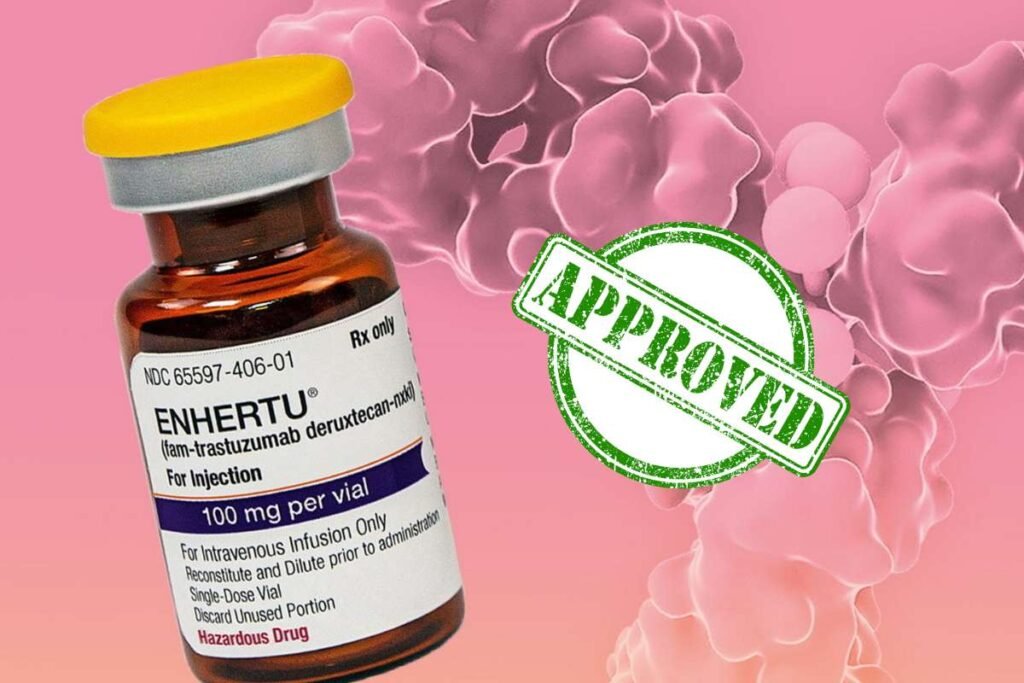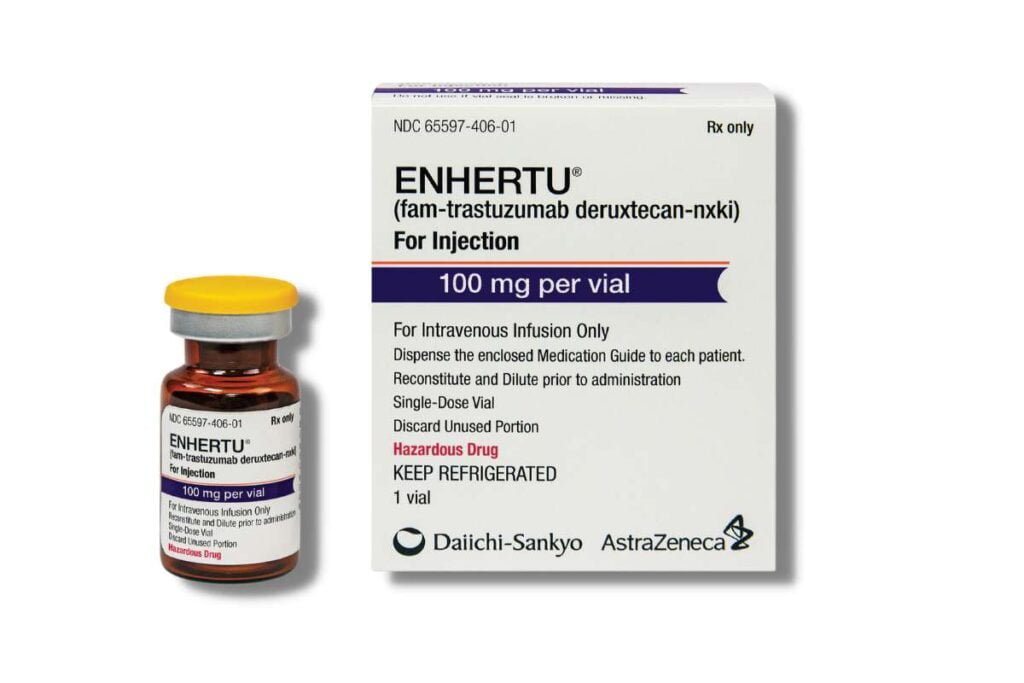This blog post will review how Enhertu in breast cancer works, how it is used, its benefits and risks, how much it costs, and its future prospects. We hope you find this information useful and interesting. Please share it with your friends and family who may benefit from it. And don’t forget to subscribe to our blog for more updates on Enhertu and other topics related to breast cancer.
HER2 stands for human epidermal growth factor receptor 2, and it is a protein that helps cells grow and divide normally. However, in some types of breast cancer, HER2 is overproduced or mutated, which causes the cancer cells to grow faster and spread more easily.
HER2-positive breast cancer is a subtype of breast cancer that has high levels of HER2 on the surface of the cancer cells. About 15% to 20% of breast cancers are HER2-positive, and they tend to be more aggressive and resistant to some types of treatments than HER2-negative breast cancers.
HER2-low breast cancer is a subtype of breast cancer that has low levels of HER2 on the surface of the cancer cells but not enough to qualify as HER2-positive. About 40% to 50% of breast cancers are HER2-low, and they may also be more aggressive and resistant to some types of treatments than HER2-negative breast cancers.
For many years, the standard treatment for HER2-positive breast cancer has been a combination of chemotherapy and anti-HER2 therapies. Anti-HER2 therapies target HER2 and block its signaling, slowing down or stopping the growth and spread of the cancer cells. Some examples of anti-HER2 therapies are trastuzumab (Herceptin), pertuzumab (Perjeta), lapatinib (Tykerb), neratinib (Nerlynx), and others.
However, even with these therapies, many patients with HER2-positive breast cancer eventually develop resistance or experience disease progression or recurrence. This means that there is an unmet need for new and more effective treatments for this type of breast cancer.
For HER2-low breast cancer, there has been no approved targeted therapy until recently. The standard treatment for HER2-low breast cancer has been chemotherapy or hormone therapy, depending on the tumor’s hormone receptor status. However, these therapies have limited efficacy and significant side effects for many patients.
Fortunately, a new treatment option for patients with HER2-positive and HER2-low breast cancer has shown remarkable results in clinical trials. This treatment is Enhertu (fam-trastuzumab deruxtecan-nxki), a drug that combines two components: a HER2-targeting antibody (trastuzumab) and a chemotherapy payload (deruxtecan). Enhertu works by binding to HER2 on the surface of cancer cells and delivering the chemotherapy directly inside them, killing them and also nearby cancer cells through a “bystander effect”.
Enhertu has been approved by the Food and Drug Administration (FDA) and other regulatory agencies for the treatment of some adults with HER2-positive metastatic breast cancer (MBC), meaning breast cancer that has spread to other parts of the body, who have received prior anti-HER2 therapies. The FDA has also approved Enhertu for the treatment of adults with unresectable or metastatic HER2-low breast cancer who have received prior chemotherapy or hormone therapy.
How Enhertu in Breast Cancer Works

Enhertu is an antibody-drug conjugate (ADC), which is a type of targeted therapy that combines an antibody that recognizes a specific marker on cancer cells with a toxic drug that kills them. The antibody acts as a delivery vehicle that brings the drug to the target site, while sparing normal cells that do not have the marker.
Enhertu consists of two parts: trastuzumab and deruxtecan. Trastuzumab is a monoclonal antibody that binds to HER2 on the surface of cancer cells. Deruxtecan is a topoisomerase I inhibitor, which is a type of chemotherapy drug that interferes with DNA replication in dividing cells.
When Enhertu reaches the target site, it attaches to HER2 on the cancer cells. The cell then internalizes the antibody-drug complex through a process called endocytosis. Inside the cell, the enzyme called lysosomes releases the drug from the antibody. The drug then enters the nucleus of the cell, where it binds to DNA and prevents it from unwinding and separating during cell division. This causes DNA damage and cell death.
The drug also has a “bystander effect”, which means that it can diffuse out of the cell and kill nearby cancer cells that may not have HER2 on their surface. This increases the potency and efficacy of Enhertu.
Enhertu is designed to target and kill cancer cells that have high or low levels of HER2 while sparing normal cells that have no or very low levels of HER2. This makes Enhertu a suitable treatment for both HER2-positive and HER2-low breast cancer.
How Enhertu in Breast Cancer Used
Enhertu is given as an infusion into a vein every 3 weeks. The dose of Enhertu is based on the body weight of the patient. The infusion usually takes about 90 minutes for the first dose and about 30 minutes for subsequent doses.
Enhertu is used in different settings depending on the type and stage of breast cancer.
For HER2-positive MBC, Enhertu is used as a second-line or later treatment after the disease has progressed on or after at least one prior anti-HER2 therapy. This may include trastuzumab, pertuzumab, lapatinib, neratinib, or others. Enhertu may also be used as a second-line or later treatment for patients who have received anti-HER2 therapy in the neoadjuvant (before surgery) or adjuvant (after surgery) setting and have developed disease recurrence during or within 6 months of completing therapy.
For HER2-low MBC, Enhertu is used as a third-line or later treatment after the disease has progressed on or after at least two prior hormone therapies. This may include tamoxifen, aromatase inhibitors, fulvestrant, or others. Enhertu may also be used as a third-line or later treatment for patients who have received chemotherapy in the neoadjuvant, adjuvant, or metastatic setting and have developed disease recurrence during or within 6 months of completing therapy.
Enhertu is also being tested in clinical trials for other types of breast cancer, including early-stage, locally advanced, and metastatic disease. These trials compare Enhertu with other standard treatments to see if it can improve outcomes and quality of life for patients with different risk factors and treatment histories.
Enhertu Approval in HER2-Low and HER2-Positive Breast Cancer

Enhertu has been approved by different regulatory agencies around the world for the treatment of HER2-positive and HER2-low breast cancer. In December 2019, the FDA approved Enhertu for the treatment of HER2-positive MBC who have received at least two prior anti-HER2 therapies. In May 2022, the FDA expanded the approval of Enhertu for the treatment of HER2-positive MBC who have received a prior anti-HER2 therapy either in the metastatic setting or in the neoadjuvant or adjuvant setting and have developed disease recurrence during or within 6 months of completing therapy. In August 2022, the FDA approved Enhertu for the treatment of HER2-low MBC who have received prior chemotherapy or hormone therapy.
In January 2021, the European Medicines Agency (EMA) approved Enhertu for the treatment of HER2-positive MBC who have received at least two prior anti-HER2 therapies. Later in January 2023, Enhertu was approved in the European Union (EU) as monotherapy for the treatment of adult patients with unresectable or metastatic HER2-low (IHC 1+ or IHC 2+/ISH-) breast cancer who have received prior chemotherapy in the metastatic setting or developed disease recurrence during or within six months of completing adjuvant chemotherapy.
In March 2020, Japan approved Enhertu for the treatment of HER2-positive unresectable or recurrent breast cancer after prior chemotherapy. This approval is based on the results of clinical trials that showed Enhertu’s superior efficacy and comparable safety to other treatments in these settings. In November 2022, Enhertu was approved for treating adult patients with HER2-positive unresectable or recurrent breast cancer after prior chemotherapy, including trastuzumab (Herceptin) and a taxane in Japan. In March 2023, Enhertu was approved in Japan for the treatment of adult patients with HER2 low (IHC 1+ or IHC 2+/ISH-) unresectable or recurrent breast cancer after prior chemotherapy.
What Are the Benefits of Enhertu In Breast Cancer
Enhertu has shown remarkable benefits in clinical trials for patients with HER2-positive and HER2-low MBC who have received prior treatments.
For HER2-positive MBC, Enhertu was compared with another anti-HER2 ADC, trastuzumab emtansine (T-DM1 or Kadcyla), in a Phase III trial called DESTINY-Breast03. The trial enrolled 524 patients who had received at least one prior anti-HER2 therapy for metastatic disease. The trial’s primary endpoint was progression-free survival (PFS), meaning the time from the start of treatment until the disease got worse or the patient died.
The trial showed that Enhertu was superior to T-DM1 in terms of PFS. The median PFS for Enhertu was not reached at the time of the analysis, meaning that more than half of the patients were still alive and without disease progression. The median PFS for T-DM1 was 6.8 months, meaning half of the patients had their disease worsen or died within 6.8 months.
This translated into a 72% reduction in the risk of disease progression or death with Enhertu. This translated into a 72% reduction in the risk of disease progression or death with Enhertu compared to T-DM1. The objective response rate (ORR) was also higher with Enhertu (79.7%) than with T-DM1 (34.2%), meaning that more patients had their tumors shrink or disappear with Enhertu. The duration of response (DOR) was also longer with Enhertu (not reached) than with T-DM1 (6.5 months), meaning that the responses lasted longer with Enhertu.
For HER2-low MBC, Enhertu was compared with chemotherapy in a Phase III trial called DESTINY-Breast04. The trial enrolled 600 patients who had received at least two prior hormone therapies for metastatic disease. The primary endpoint of the trial was PFS.
The trial showed that Enhertu was superior to chemotherapy in terms of PFS. The median PFS for Enhertu was not reached at the time of the analysis, meaning that more than half of the patients were still alive and without disease progression. The median PFS for chemotherapy was 4.1 months, meaning that half of the patients had their disease worsen or died within 4.1 months.
This translated into a 75% reduction in the risk of disease progression or death with Enhertu compared to chemotherapy. The ORR was also higher with Enhertu (37%) than with chemotherapy (9%), meaning that more patients had their tumors shrink or disappear with Enhertu. The DOR was also longer with Enhertu (not reached) than with chemotherapy (4.2 months), meaning that the responses lasted longer with Enhertu.
These results show that Enhertu can improve outcomes and quality of life for patients with HER2-positive and HER2-low MBC who have received prior treatments. Enhertu can offer a new hope for these patients who have limited options and poor prognosis.
What Are the Enhertu Side Effects

Enhertu side effects and risks that need to be considered. Enhertu can cause serious side effects, including:
Lung problems that may be severe, life-threatening or that may lead to death. If you develop lung problems, your healthcare provider may treat you with corticosteroid medicines. Tell your healthcare provider right away if you get any of the following signs and symptoms: cough, trouble breathing or shortness of breath, fever, or other new or worsening breathing symptoms (e.g., chest tightness, wheezing).
Low white blood cell count (neutropenia). Low white blood cell counts are common with Enhertu and can sometimes be severe. Your healthcare provider will check your white blood cell counts before starting Enhertu and before starting each dose. Tell your healthcare provider right away if you develop any signs or symptoms of an infection or have fever or chills during treatment with Enhertu.
Heart problems that may affect your heart’s ability to pump blood. Your healthcare provider will check your heart function before starting treatment with Enhertu. Tell your healthcare provider right away if you get any of the following signs and symptoms: new or worsening shortness of breath, coughing, feeling tired, swelling of your ankles or legs, irregular heartbeat, sudden weight gain, dizziness or feeling light-headed, or loss of consciousness.
Your healthcare provider will check you for these side effects during your treatment with Enhertu. Your healthcare provider may reduce your dose, delay treatment or completely stop treatment with Enhertu if you have severe side effects.
Enhertu can also cause harm to your unborn baby. Tell your healthcare provider right away if you become pregnant or think you might be pregnant during treatment with Enhertu.
The most common side effects of Enhertu are nausea, fatigue, vomiting, hair loss, constipation, decreased appetite, anemia (low red blood cell count), diarrhea and cough.
These are not all the possible Enhertu side effects. For more information, ask your healthcare provider or pharmacist. You can also visit www.enhertu.com for more information about Enhertu and its side effects.
How Much Does Enhertu Price

Enhertu is a very expensive drug. The list price of Enhertu is $13,311 per vial, which contains 100 mg of the drug. The average dose of Enhertu is 5.4 mg per kg of body weight every 3 weeks. This means that a patient who weighs 70 kg (154 lbs) would need about 378 mg of Enhertu per dose, which would cost about $50,334.
However, the list price is not the actual price that most patients pay for Enhertu. The actual price depends on many factors, such as your insurance coverage, copayments, deductibles, coinsurance and discounts.
If you have health insurance that covers prescription drugs, you may pay less than the list price for Enhertu. However, you may still have to pay a significant amount out of pocket, depending on your plan details and benefits.
If you do not have health insurance or if your insurance does not cover Enhertu, you may have to pay the full list price for Enhertu or even more, depending on where you get it from.
Fortunately, some programs and resources can help you pay for Enhertu if you cannot afford it.
One of these programs is ENHERTU4U™, which is a patient support program offered by Daiichi Sankyo and AstraZeneca, the manufacturers of Enhertu. ENHERTU4U™ can help eligible patients with a valid prescription of ENHERTU may pay as little as $0 per infusion and $0 out-of-pocket costs for ENHERTU, up to $26,000 per calendar year.ENHERTU4U™ can also help eligible patients without insurance or with Medicare Part D get access to financial assistance programs from independent foundations or patient assistance programs from Daiichi Sankyo and AstraZeneca.
To enroll in ENHERTU4U™, you need to fill out an enrollment form and submit it to the program along with a prescription for Enhertu from your healthcare provider. You can download the enrollment form from www.enhertu4U.com or call 1-833-ENHERTU (1-833-364-3788) to request one.
Another resource that can help you pay for Enhertu is GoodRx, which is a website and app that compares prices and discounts for prescription drugs at different pharmacies near you. GoodRx can help you find the lowest price for Enhertu in your area and get coupons that can save you up to 80% off the list price. You can visit www.goodrx.com or download the GoodRx app to search for Enhertu and see the prices and discounts available at different pharmacies.
These are some of the programs and resources that can help you pay for Enhertu if you cannot afford it. However, they may not cover the full cost of Enhertu or be available to everyone. You should always talk to your healthcare provider and pharmacist about your treatment options and costs before starting Enhertu.
What Are the Future Prospects of Enhertu
Enhertu is a breakthrough treatment for HER2-positive and HER2-low breast cancer that has changed the treatment landscape and improved the lives of many patients. However, Enhertu is not a cure for breast cancer, and some patients may still experience disease progression or recurrence after treatment with Enhertu.
Therefore, there is still a need for more research and development to find new and better treatments for breast cancer. Enhertu is also being tested in clinical trials for other types of cancer that have HER2 overexpression or mutation, such as gastric, colorectal, lung and ovarian cancers. Enhertu may also be combined with other therapies, such as immunotherapy, hormone therapy or other targeted therapy, to enhance its efficacy and overcome resistance.
Enhertu is a testament to the power of innovation and collaboration in cancer research and development. Enhertu is an example of how targeted therapy can improve outcomes and quality of life for patients with breast cancer.
Conclusion
Enhertu is a novel antibody-drug conjugate that targets HER2 and delivers a potent chemotherapy payload to kill cancer cells. The FDA and other regulatory agencies have approved Enhertu for the treatment of some adults with HER2-positive and HER2-low metastatic breast cancer who have received prior treatments. Enhertu has shown superior efficacy and comparable safety to other anti-HER2 therapies in this setting.
Enhertu is also being tested in clinical trials for other types of breast cancer, including early-stage, locally advanced and metastatic disease. Enhertu has shown promising results in patients with HER2-positive and HER2-low breast cancer who have different risk factors and treatment histories.
Enhertu is a game-changer for patients with HER2-positive and HER2-low breast cancer and hope for patients with other cancer types with HER2 overexpression or mutation. Enhertu is an example of how targeted therapy can improve outcomes and quality of life for patients with cancer.
If you or someone you know has been diagnosed with breast cancer, talk to your doctor about your treatment options and whether Enhertu may be right for you. You can also visit www.enhertu.com for more information about Enhertu and its clinical trials.
Thank you for reading this blog post about Enhertu. We hope you found it informative and interesting. Please share it with your friends and family who may benefit from it. And don’t forget to subscribe to our blog for more updates on Enhertu and other topics related to cancer.
FAQ’s
What is HER2 and how does it affect breast cancer?
HER2 is a protein that helps cells grow and divide normally. However, in some types of breast cancer, HER2 is overproduced or mutated, which causes the cancer cells to grow faster and spread more easily. HER2-positive breast cancer is a subtype of breast cancer that has high levels of HER2 on the surface of the cancer cells. HER2-low breast cancer is a subtype of breast cancer that has low levels of HER2 on the surface of the cancer cells, but not enough to qualify as HER2-positive.
How does Enhertu work and what are its benefits?
Enhertu is an antibody-drug conjugate (ADC), which is a type of targeted therapy that combines an antibody that recognizes HER2 with a toxic drug that kills cancer cells. Enhertu works by binding to HER2 on the surface of cancer cells and delivering the drug directly inside them, killing them and also nearby cancer cells through a “bystander effect”. Enhertu has shown remarkable benefits in clinical trials for patients with HER2-positive and HER2-low metastatic breast cancer (MBC) who have received prior treatments. Enhertu can improve outcomes and quality of life for these patients who have limited options and poor prognosis.
How is Enhertu used and who is eligible for it?
Enhertu is given as an infusion into a vein every 3 weeks. The dose of Enhertu is based on the body weight of the patient. Enhertu is used in different settings depending on the type and stage of breast cancer. For HER2-positive MBC, Enhertu is used as a second-line or later treatment, after the disease has progressed on or after at least one prior anti-HER2 therapy. For HER2-low MBC, Enhertu is used as a third-line or later treatment, after the disease has progressed on or after at least two prior hormone therapies. Enhertu is also being tested in clinical trials for other types of breast cancer, including early-stage, locally advanced and metastatic disease.
What are the side effects and risks of Enhertu?
Enhertu can cause serious side effects, including lung problems, low white blood cell count, heart problems and harm to unborn babies. The most common side effects of Enhertu are nausea, fatigue, vomiting, hair loss, constipation, decreased appetite, anemia, diarrhea and cough. These are not all the possible side effects of Enhertu. Patients should talk to their healthcare provider or pharmacist about the possible side effects and how to manage them.
How much does Enhertu cost and how can I afford it?
Enhertu is a very expensive drug. The list price of Enhertu is $13,311 per vial, which contains 100 mg of the drug. The actual price depends on many factors, such as insurance coverage, copayments, deductibles, coinsurance and discounts. There are some programs and resources that can help patients pay for Enhertu if they cannot afford it. One of these programs is ENHERTU4U™ , which is a patient support program offered by Daiichi Sankyo and AstraZeneca, the manufacturers of Enhertu. Another resource that can help patients pay for Enhertu is GoodRx , which is a website and app that compares prices and discounts for prescription drugs at different pharmacies near them. Patients should always talk to their healthcare provider and pharmacist about their treatment options and costs before starting Enhertu.





























